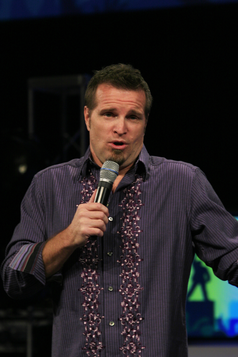Q&A with Thor Ramsey
Author of "The End Times Comedy Show"
Q: In the midst of writing this book, you continue to travel and do stand-up comedy. What makes your comedy unique?
A: Since 1987, there hasn’t been a year that I haven’t performed standup comedy on stage somewhere. I think my standup has been most valuable in developing my writing style. Often when I have picked up a novel that some reviewer has deemed hilarious, I found that it was only mildly amusing. Whether in print or on stage, comedy shouldn’t make you smile or nod. It should make you laugh. And when someone says a book is hilarious, then there better be some moments while you’re reading it where you laugh out loud.
Q: What prompted the idea for this book?
A: It really started with an image. It was the late 90s, and I was thinking about the brutality of the crucifixion. Then I wondered about the two thieves and what it would be like to be crucified alongside Christ. Then I asked, “What if… what if someone today could go back and experience that?” And then I just started asking myself questions. “What happens next? And what happened before that to make this necessary?” When you have an idea, one thing leads to another, and a decade later, you have a novel.
Q: While your book is very funny, it takes on some serious issues such as deconversion. Talk about that.
A: Defections from the faith have always interested me. I started writing this book in the late 90s when Franky Schaeffer’s defection was big news. Now, these defections are happening with some frequency and have been dubbed deconversions, which spellchecker doesn’t recognize yet. (So how legitimate can they be, really?) I also found Rob Bell’s story intriguing, and my wife is from Grand Rapids, Michigan, so in my visits to her hometown (Kentwood), I met some insiders who gave me some insight into his defection. There are other defectors, of course, and together they form the character of Timothy, Sam’s brother in the storyline. So, the novel has this juxtaposition: Sam has left the church and wants to deconvert but can’t seem to get there, whereas Timothy has remained in the church because that’s where he makes his living, but he’s successful in leaving the faith.
A: Since 1987, there hasn’t been a year that I haven’t performed standup comedy on stage somewhere. I think my standup has been most valuable in developing my writing style. Often when I have picked up a novel that some reviewer has deemed hilarious, I found that it was only mildly amusing. Whether in print or on stage, comedy shouldn’t make you smile or nod. It should make you laugh. And when someone says a book is hilarious, then there better be some moments while you’re reading it where you laugh out loud.
Q: What prompted the idea for this book?
A: It really started with an image. It was the late 90s, and I was thinking about the brutality of the crucifixion. Then I wondered about the two thieves and what it would be like to be crucified alongside Christ. Then I asked, “What if… what if someone today could go back and experience that?” And then I just started asking myself questions. “What happens next? And what happened before that to make this necessary?” When you have an idea, one thing leads to another, and a decade later, you have a novel.
Q: While your book is very funny, it takes on some serious issues such as deconversion. Talk about that.
A: Defections from the faith have always interested me. I started writing this book in the late 90s when Franky Schaeffer’s defection was big news. Now, these defections are happening with some frequency and have been dubbed deconversions, which spellchecker doesn’t recognize yet. (So how legitimate can they be, really?) I also found Rob Bell’s story intriguing, and my wife is from Grand Rapids, Michigan, so in my visits to her hometown (Kentwood), I met some insiders who gave me some insight into his defection. There are other defectors, of course, and together they form the character of Timothy, Sam’s brother in the storyline. So, the novel has this juxtaposition: Sam has left the church and wants to deconvert but can’t seem to get there, whereas Timothy has remained in the church because that’s where he makes his living, but he’s successful in leaving the faith.
Q: The book also has some supernatural elements to it. Why was that important to the story?
A: Christianity is the one religion that doesn’t exist without the miraculous. It’s the central idea of Christianity—Christ rose from the dead. As Christians, we proclaim he’s still interacting with people through the Holy Spirit. I’m not sure how you make Christianity less miraculous, but we certainly try for some reason. And that’s the satirical element of the supernatural in the story. Here you have someone trying to apostatize, but he keeps encountering the supernatural. It’s like an abortionist who keeps getting confronted by ultrasounds. And what’s satirical about life is how much we can deny the reality that's right in front of us.
Q: Your last statement about denying reality has serious relevance to what is going on in our culture right now. Is that why you decided to do The Protest Show on YouTube? How can Christians combat reality deniers?
A: Yes, The Protest Show is truly that—a peaceful form of protest. And the only way to combat reality deniers is with the truth. But the times we’re living in are satirical, which is great news if you want to write satire. The problem is when people are living in satirical times, they tend not to recognize irony. For instance, I just saw this protest sign in an email this morning: “Abortion is healthcare.” That’s a satirical statement that one can only take seriously by denying reality. Now, whether this is done consciously or obliviously is another question.
Q: What do you hope readers gain from reading this book?
A: I hope they see there are other possibilities for fictional writing with Christian themes. Someone once said, “If you can’t find the book you want, write it.” The authors I admire are Hemingway, Salinger, Fitzgerald, the contemporary style writers, but I couldn’t find any novels written from a blatantly Christian worldview that were in that vein. Even Nick Hornby, Martin Amis, and the likes didn’t have any Christian counterparts I knew of (before I discovered Leif Enger). Now, I don’t place myself in the same category as any of those authors, but I wanted a contemporary, funny book, so that’s what I tried to write.
A: Christianity is the one religion that doesn’t exist without the miraculous. It’s the central idea of Christianity—Christ rose from the dead. As Christians, we proclaim he’s still interacting with people through the Holy Spirit. I’m not sure how you make Christianity less miraculous, but we certainly try for some reason. And that’s the satirical element of the supernatural in the story. Here you have someone trying to apostatize, but he keeps encountering the supernatural. It’s like an abortionist who keeps getting confronted by ultrasounds. And what’s satirical about life is how much we can deny the reality that's right in front of us.
Q: Your last statement about denying reality has serious relevance to what is going on in our culture right now. Is that why you decided to do The Protest Show on YouTube? How can Christians combat reality deniers?
A: Yes, The Protest Show is truly that—a peaceful form of protest. And the only way to combat reality deniers is with the truth. But the times we’re living in are satirical, which is great news if you want to write satire. The problem is when people are living in satirical times, they tend not to recognize irony. For instance, I just saw this protest sign in an email this morning: “Abortion is healthcare.” That’s a satirical statement that one can only take seriously by denying reality. Now, whether this is done consciously or obliviously is another question.
Q: What do you hope readers gain from reading this book?
A: I hope they see there are other possibilities for fictional writing with Christian themes. Someone once said, “If you can’t find the book you want, write it.” The authors I admire are Hemingway, Salinger, Fitzgerald, the contemporary style writers, but I couldn’t find any novels written from a blatantly Christian worldview that were in that vein. Even Nick Hornby, Martin Amis, and the likes didn’t have any Christian counterparts I knew of (before I discovered Leif Enger). Now, I don’t place myself in the same category as any of those authors, but I wanted a contemporary, funny book, so that’s what I tried to write.
About Thor Ramsey:
|
Thor Ramsey has been a stand-up comedian for over three decades and was featured in three Thou Shalt Laugh comedy movies, which sold over a half-million DVDs and were broadcast on Netflix and cable television. Aside from his own television series, Comedy At Large with Thor Ramsey, which aired for one season on the i-Life Network, he hosted Bananas, the family-friendly comedy series that ran four seasons and was broadcast into over 90 million homes, and later purchased by Sony Television.
He wrote the screenplay and starred in the 2021 comedy feature film, Church People. He recently had his screenplay comedy, The Revenge of Adam and Eve, optioned by Collide Productions. He has authored three previous books: “A Comedian’s Guide to Theology,” “Thor Ramsey’s Total Money Meltdown," and “The Most Encouraging Book on Hell Ever.” For more information visit www.ThorRamsey.com. |

